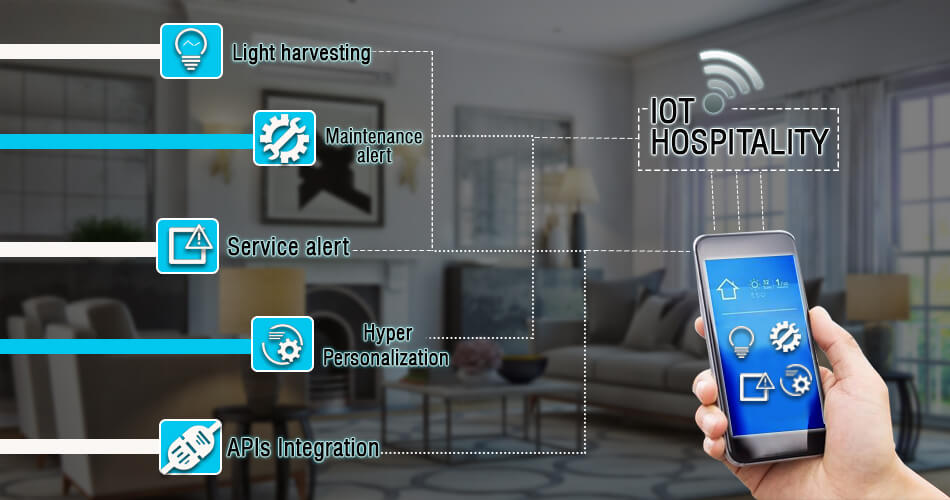A seamless guest experience with IoT
The hotel industry is undergoing a major transformation due to the widespread adoption of Internet of Things (IoT) devices, which are physical objects embedded with sensors, software and network connectivity. Hotels, resorts and other accommodations of all sizes are using these devices to improve the guest experience. IoT technology allows hotels to create a seamless, immersive and personalized experience, leading to higher guest satisfaction and loyalty.
Operational efficiency and profitability
In addition to improving the guest experience, IoT technology helps hoteliers identify and correct operational inefficiencies, improving overall performance and profitability. By leveraging IoT, hotels can minimize losses, reduce waste and maintenance costs, automate supply chain management and discover new revenue opportunities.

- IoT in action: practical examples
- Energy management: A national hotel chain deployed IoT sensors to monitor energy consumption and optimize lighting, heating and cooling, resulting in significant cost savings and a reduced carbon footprint.
- Room optimization: Boutique hotels use IoT sensors to optimize room layouts and improve services, leading to greater guest satisfaction and higher bookings.
- Inventory management: A luxury resort uses RFID technology for inventory management and inventory replenishment optimization, improving the guest experience and reducing operational costs.
- In-Room Automation: An international hotel chain uses in-room automation to assist staff with room service and improve guest interactions, creating a more efficient and personalized stay.
Market growth and future prospects
The adoption of IoT devices in the hotel industry has grown significantly and is expected to continue to grow. According to Allied Market Research, the “IoT in the Hotel Market” was valued at $28 billion in 2021 and is expected to reach $177 billion by 2031, with a compound annual growth rate (CAGR) of 20.3% between 2022 and 2031.
Enabling technologies: BLE and NFC
The rapid growth of IoT in the hotel sector is largely driven by connected technologies such as Bluetooth Low Energy (BLE) and Near-Field Communication (NFC). These wireless communication protocols allow devices to communicate without an internet connection, creating interconnected ecosystems within hotels.
- BLE: Useful for creating beacons that transmit data to guest devices within a range of 100 meters. BLE allows hotels to send notifications to guests’ smartphones and create smart rooms that track inventory levels.
- NFC: Facilitates contactless payments and smart digital signage, improves the delivery of service information and streamlines the payment process.
Addressing security risks
Although IoT offers numerous benefits, it also comes with security risks. The hospitality sector is often the target of cyber breaches, with more than 15% of attacks targeting hotels. Many breaches occur due to insufficient security features in IoT devices.
A successful attack on IoT devices can lead to large-scale breaches: 83% of hotels have experienced security incidents involving their IoT devices in the past three years. These attacks often result in financial loss, data theft, reputational damage and operational disruption.
The costs of data leaks
In 2023, IBM reported that the global average cost of a data breach was $4.45 million, an increase of 2.25% from 2022. Detecting a data breach took an average of 204 days, with an additional 73 days required to detect the breach to limit.
Confidence in IoT security
Despite the high stakes, only 35% of hoteliers are “very confident” in their ability to protect their IoT devices, while 42% are “somewhat uncertain” or “very uncertain.” Addressing these challenges effectively requires implementing robust IoT security solutions and promoting the right organizational resources, practices and performance metrics.
Conclusion
As the hotel industry accelerates its digital transformation, IoT technology plays a crucial role in improving guest experiences and operational efficiency. However, addressing security risks is essential to ensure safe and successful implementation of IoT solutions.






I like this web site it’s a master piece! Glad I discovered this ohttps://69v.topn google.Blog monetyze